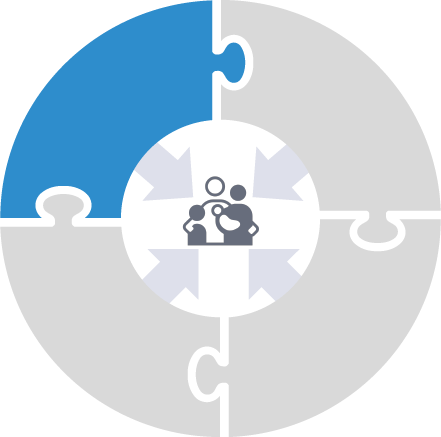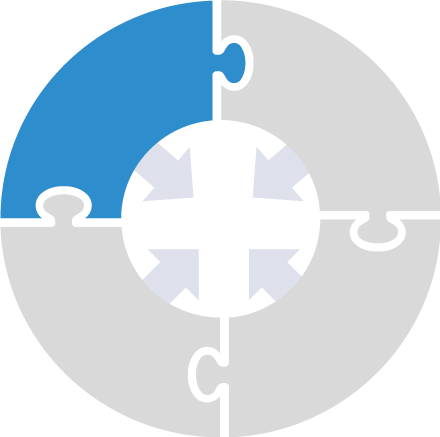Pediatric Health Care

Health & Wellbeing
Services that address the development, physical health, and mental health of young children, their caregivers, and their relational wellbeing
IN THIS SECTION
Physical Health
Pediatricians (doctors who treat newborns, children, adolescents, and young adults) are primarily responsible for addressing physical health during early childhood. They have a wide range of responsibilities from monitoring a child's development to managing chronic medical conditions. They interact with families most often through well child visits, regular check-ups that start weekly in the first month of life and then move to monthly and continue to spread out in frequency. These visits are intended to check on the health and wellbeing of the child, including assessing growth and development, providing immunizations, conducting physical exams, and more.
Equity Considerations
Some families face difficulty finding a pediatrician they trust due to lack of providers’ shared language and culture. There is an underrepresentation of BIPOC doctors and other medical staff in the healthcare profession, an issue that is particularly acute in Massachusetts (Boston Globe). Without a trusted healthcare provider, families of color, or those who do not speak English, may not receive adequate medical care or attention, and may face a biased view of their healthcare needs.
Health & Wellbeing
Ages
Birth - 5 years
Usage
Geography
Statewide
Professionals
Primary Care Providers
Settings
Primary Care Clinics, Pediatrician Offices or Community Health Clinics
Oversight, Guidance, and Regulation
Department of Public Health
Health & Wellbeing
Ages
Birth - 5 years
Usage
Geography
Statewide
Professionals
Pediatrician, Mental Health Professionals (Psychologist, Psychiatrist), School-Based Specialist (Social Worker, Counselor), Family Partners
Settings
Family's Home, Specialist Offices (often located inside larger institutions such as pediatric offices), Child Care Centers, Schools, Community Behavioral Health Centers
Oversight, Guidance, Or Regulation
Department of Public Health
Department of Mental Health
Examples
Diagnostic Classification of Mental Health and Developmental Disorders of Infancy and Early Childhood (DC: 0-5)
DC: 0-5 provides developmentally specific diagnostic criteria and information about mental health concerns in young children 0-5.
TEAM UP for Children
HealthySteps
Children’s Behavioral Health Initiative (CBHI)
CBHI: Offered by MassHealth, the CBHI supports children with behavioral, emotional, and mental health needs and their families with integrated behavioral health services and a comprehensive, community-based system of care.
Early Childhood Mental Health Consultation (ECMHC) Program
The Early Childhood Mental Health Consultation program, through the Department of Early Education and Care, does not provide direct services to families. Rather, the ECMHC grant program provides consultations to programs who work directly with children and families who have behavioral and mental health concerns.
Massachusetts Association for Infant Mental Health (MassAIMH)
The Massachusetts Association for Infant Mental Health (MassAIMH) is a non-profit interdisciplinary, professional statewide organization established to promote and support the optimal development of infants, very young children, and families through relationship-focused workforce development and advocacy efforts.
Infant & Early Childhood Mental Health
Childhood mental health concerns can often present as changes in the way children behave, learn, or handle their emotions. If symptoms persist at school, home, or play, and interfere with day-to-day activities, a child may be diagnosed with a mental health disorder. Typically a child’s pediatrician or a mental health provider would assess a child using tools that are developmentally informed, relationship-based, and culturally humble and then refer them to a specialist for further evaluation.
Equity Considerations
Mental illness affects 1 in 5 children in the United States and is among the most common health conditions. Currently, our healthcare system is set up to react to mental health concerns rather than prevent issues before they reach the level of diagnosis (CDC). If a child's mental health needs go unrecognized or undiagnosed for lengths of time, they may struggle to reach certain developmental milestones or acclimate to changes in their lives. Recently, the American Academy of Pediatrics declared a national emergency of child and adolescents mental health exacerbated by the COVID-19 pandemic (AAP).
Palliative Care
Palliative care provides a range of services for young children with chronic special health care needs, including life-limiting conditions and serious illnesses, such as cancer and heart failure. The goal of palliative care is to ease the symptoms, discomfort, and stress associated with a serious illness and to improve quality of life for the child and their family.
Health & Wellbeing
Ages
Birth - 5 years
Usage
Geography
Statewide
Professionals
Pediatrician or Family Physician, Surgeons, Social Workers, Psychiatrists, Specialists
Settings
Hospitals, Family Clinics, Family’s Home
Oversight, Guidance, and Regulation
Department of Public Health
Health & Wellbeing
Ages
Birth - 5 years
Usage
Geography
Statewide
Professionals
Surgeons, Specialists, Emergency Room Pediatricians, Urgent Care Doctors and Nurses
Settings
Hospitals, Urgent Care Centers
Oversight, Guidance, and Regulation
Department of Public Health
Emergency Care
When medical or health needs are urgent and sudden, emergency care comes into play. Medical concerns such as high fevers, seizures, rashes, or unexplained crying in infants and children can be signs of the need for urgent care rather than pediatric care.
Pediatric Medical Home
A Pediatric Medical Home model is not a place, but rather a partnership of a variety of care providers to ensure the best patient care for young children and families. Oftentimes families are left to navigate the healthcare system alone which can be daunting, especially when they cannot find the type or quality of care that they need. Centering patient needs and care, a Medical Home coordinates all elements of the broader health care system including primary care, specialists, hospitals, community services and more, to ensure high quality physical and mental health care.
Health & Wellbeing
Ages
Birth - 5 years
Usage
Geography
Statewide
Professionals
Primary Care Providers, Specialists, Subspecialists, Hospital Staff, Public Health Officials
Settings
Family’s Home, Hospitals and Healthcare Facilities
Equity Considerations
Although Pediatric Home Models have been shown to increase health equity, children currently have inequitable access to them. In
2019-2020, 62.7% of White children in Massachusetts without special medical needs had access to a pediatric medical home. However, just 32.4% of Hispanic children and 49% of Black children had the same access.
Health & Wellbeing
Ages
Birth - 7 years
Usage
Geography
Statewide
Professionals
Multidisciplinary team that includes Physicians, Nurses, Dietitians, Social Workers, and/or Case Managers
Settings
Health Clinics, Primary Care Settings (Pediatrician/Physician Offices)
Oversight, Guidance, and Regulation
Department of Public Health
Growth and Nutrition Programs
Growth and Nutrition Clinics are located throughout the state to provide services to infants and young children who are experiencing slow or poor physical growth. Some clinics offer additional services such as feeding groups or home visiting.






